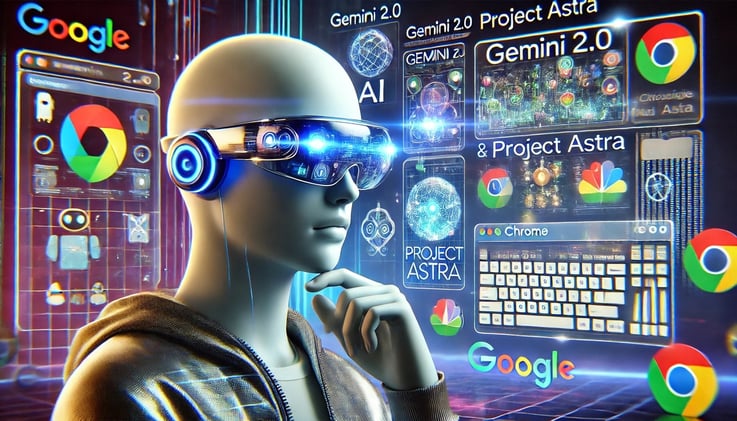Google’s Gemini 2.0 and New AI Prototypes Mark the Beginning of an Agentic Era in Artificial Intelligence

[Image Source: ChatGPT-4/Google](no image included)
In a significant development, Google has announced the launch of its second-generation AI model, Gemini 2.0, along with innovative research prototypes like Project Mariner and updates to Project Astra. This marks the beginning of a "new agentic era," as described by CEO Sundar Pichai, which focuses on virtual assistants capable of greater autonomy, empowering them to take proactive actions with user oversight.
Gemini 2.0: Expanding Google’s AI Capabilities
Google released four versions of its Gemini AI model in December 2023 and has since introduced updates to the Flash version, its second most affordable model. The enhancements bring forth significant improvements in processing images and audio, as well as performance for a broader range of tasks.
Key Updates to Gemini Flash
- Enhanced Image Processing: Improved capabilities for processing images, enabling users to explore their creative potential more effectively.
- Audio Capabilities: Enhanced performance for handling audio-related tasks, such as voice recognition and sound effects analysis.
- Upcoming Releases: Planned updates to other Gemini models are expected to be released in 2025, further expanding Google’s AI capabilities.
Gemini’s capabilities are being seamlessly integrated into Google’s core products, including its search engine, Android, and YouTube. One notable application is AI Overviews, which enhances search functionality by summarizing complex information. This integration enables users to leverage the full potential of Gemini within their daily lives.
Google’s Strategy: Leveraging Widespread Adoption
Unlike competitors like OpenAI and Anthropic, Google’s strategy hinges on embedding its AI advancements into products already used by over 2 billion people monthly. These products, including Search, Android, and YouTube, give Google a significant edge in scaling its AI offerings.
Competitive Landscape
OpenAI recently launched new offerings, including a $200-per-month ChatGPT subscription and the Sora text-to-video model. Other startups like Perplexity and xAI are also vying for market share, but Google’s expansive user base provides a unique advantage.
At the Reuters NEXT conference, Ruth Porat, Alphabet’s president and chief investment officer, emphasized the importance of AI in transforming search, underscoring its centrality to the company’s strategy.
Project Astra: A Universal AI Agent
Google demonstrated updates to Project Astra, a prototype universal AI agent designed to assist users in real time. The new features include:
Ability to Hold Conversations Using Multiple Languages
- Users can now engage with Astra in various languages, enabling seamless communication across linguistic boundaries.
- This feature expands the potential applications of Astra, making it a more versatile tool for users worldwide.
Integration with Google Maps and Lens for Contextual Awareness
- Project Astra is now integrated with Google Maps and Lens, providing context-aware assistance to users in real-time.
- This integration enhances Astra’s ability to offer personalized recommendations and support.
Enhanced Interaction with Information Captured by a Smartphone Camera
- Users can now interact with information captured by their smartphone camera more effectively using Astra.
- This feature enables users to access relevant information and take proactive actions based on visual input.
Google is also testing Astra on prototype smart glasses, marking its first venture into the wearable tech space since Google Glass. This move comes as competitors like Meta introduce their own augmented reality (AR) glasses, signaling a resurgence of interest in the product category.
Project Mariner: Automating Complex Tasks
Google revealed Project Mariner, a Chrome web browser extension that automates repetitive tasks, such as keystrokes and mouse clicks. The additional capabilities include:
Jules
- A feature designed to streamline software coding by providing users with AI-powered assistance.
- Jules aims to simplify the development process, reducing manual effort and increasing productivity.
Decision-Making Tools
- A tool that assists users in making decisions like what to do or choosing actions or items to buy in video games.
- This feature leverages AI to provide personalized recommendations, enabling users to make informed choices more efficiently.
Mariner represents a direct competitor to Anthropic’s ‘computer use’ functionality, further advancing Google’s focus on task automation. By introducing Project Mariner, Google is expanding its efforts to simplify complex tasks and integrate AI into daily life seamlessly.
Looking Ahead
Google’s announcements mark a pivotal shift toward AI-powered tools that blend autonomy with user oversight, a hallmark of the ‘agentic era.’ By embedding Gemini and its AI prototypes into widely adopted platforms, Google is leveraging its vast user base to outpace competitors in the AI race. This strategy also aligns with a growing consumer demand for AI that simplifies tasks and integrates seamlessly into daily life.
From enhancing search with AI Overviews to testing Astra on smart glasses, Google is positioning itself as a leader in the next phase of AI innovation.